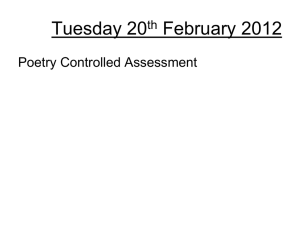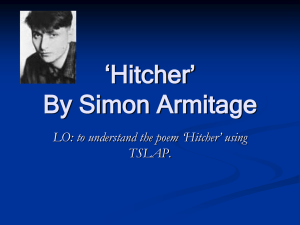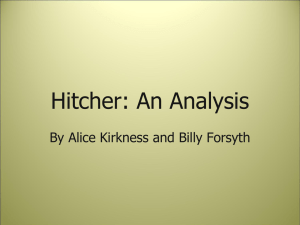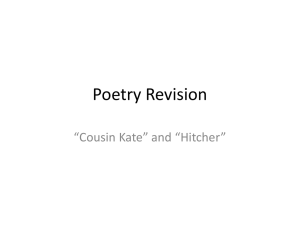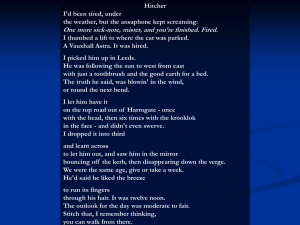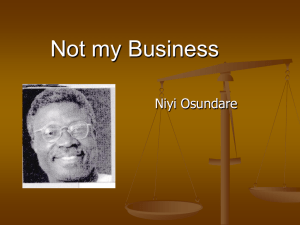February 2012 Hitcher
advertisement
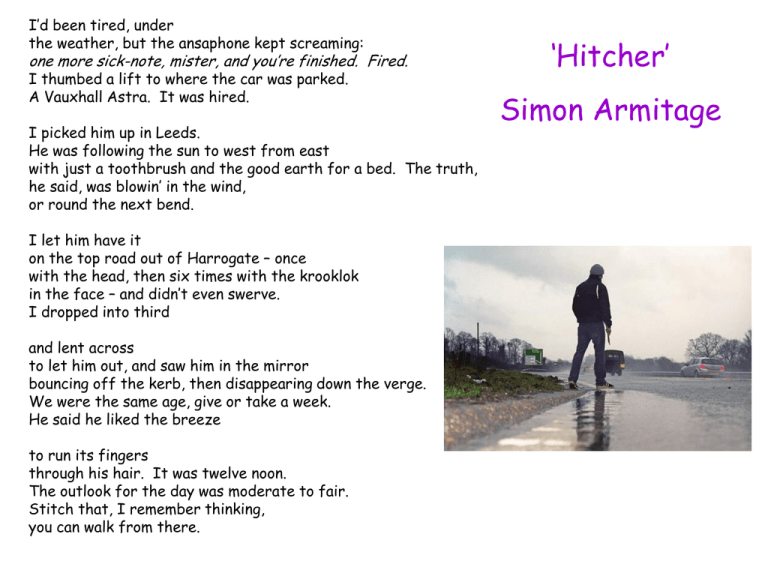
I’d been tired, under the weather, but the ansaphone kept screaming: one more sick-note, mister, and you’re finished. Fired. I thumbed a lift to where the car was parked. A Vauxhall Astra. It was hired. I picked him up in Leeds. He was following the sun to west from east with just a toothbrush and the good earth for a bed. The truth, he said, was blowin’ in the wind, or round the next bend. I let him have it on the top road out of Harrogate – once with the head, then six times with the krooklok in the face – and didn’t even swerve. I dropped into third and lent across to let him out, and saw him in the mirror bouncing off the kerb, then disappearing down the verge. We were the same age, give or take a week. He said he liked the breeze to run its fingers through his hair. It was twelve noon. The outlook for the day was moderate to fair. Stitch that, I remember thinking, you can walk from there. ‘Hitcher’ Simon Armitage First person narrative; immediacy Hitcher Fed up with his job? I'd been tired, under the weather, but the ansaphone kept screaming: Stock phrase Why the use of italics? Sounds romantic. The hitcher has freedom and no responsibilities Why the unusual spelling? One more sick-note, mister, and you're finished. Fired. I thumbed a lift to where the car was parked. People putting pressure on him A Vauxhall Astra. It was hired. Matter of fact tone I picked him up in Leeds. He was following the sun to west from east with just a toothbrush and the good earth for a bed. The truth he said, was blowin' in the wind, or round the next bend. Echo of Bob Dylan song “blowin’ in the wind” Takes his frustrations out on the hitcher. The narrator envies him I let him have it on the top road out of Harrogate - once with the head, then six times with the krooklok in the face - and didn't even swerve. Stark violent images I dropped it into third Enjambment and leant across to let him out, and saw him in the mirror bouncing off the kerb, then disappearing down the verge. Echo of the We were the same age, give or take a week. Hitcher’s voice, He'd said he liked the breeze different language from Personification, what effect the narrator to run its fingers does this create? through his hair. It was twelve noon. The outlook for the day was moderate to fair. Colloquial Stitch that, I remember thinking, you can walk from there. Why are the similar ages interesting? Return to normality, details of time and weather The Speaker/Driver • • • • • • • • • Unreliable A ‘shirker’ Tired, stressed. Frustrated with life. Brutal Violent Lack of guilt of conscience Gloating No regard for human life The Hitcher • Carefree • Lack of responsibilities or obligations. • Enjoys life. • Takes pleasure in nature. • A hippie. How do the speaker and the Hitcher differ? What could be the reasons behind the speaker murdering the Hitchhiker? In the poem a man confesses to murder. The speaker in the poem is at some point alike, and yet unlike, his victim. Briefly, the narrative voice in the poem has been taking time off work and not answering his phone. Being threatened with the sack , he goes in to work again. He gets a lift to his hired car. As he drives out of Leeds he picks up a hitchhiker who is travelling with no set destination. Some little way later, he attacks his passenger, and throws him out of the still-moving car. The description of his actions are understated and could easily be missed. The last he sees of the hitchhiker, he is “bouncing off the kerb, then disappearing down the verge” - we do not know if he is dead or just badly injured. It is clear that the driver does not care. Themes • Disturbed Characters: The violence and unpleasantness of the speak is clear. • Danger: Violence – the vulnerability of the hitchhiker. • Can you think of any other significant themes? ITLFTO - Language ‘One more sick note, mister.....’. He was following the sun from east to west ‘I thumbed a lift.’ ‘I’d been tired.’ ‘The ansaphone kept screaming.’ ‘just a toothbrush and the good earth for a bed.’ ‘The truth, he said, was blowin’ in the wind. ‘I let him have it.’ ‘Once to the head and then six times with the krooklok to the face’ ‘bouncing off the kerb.’ ‘He said he liked the breeze to run its fingers through his hair.’ ‘Did n’t even swerve.’ ‘we were the same age, give or take a week.’ • What is PEE? • Point • Evidence (quote) • Explain • PEE Model • Point: Description is used in the poem to amplify the violence of the speaker. • Evidence (quote) “Bouncing off the kerb” • Explain: enables the reader to imagine the hitcher’s body falling from the car – with the effective use of the verb bouncing. Form The poem is written in free verse. This enables his thoughts to change rapidly. Technique This poem has an unusual structure of five stanzas with five lines of short, medium, and long lengths. Why do you think Armitage chose to use this structure? Why do many of the lines run over into the next? What effect does this have? The poem is a ‘monologue’. Written in the first person in the form of continuous speech the character often leaves clues about themselves and their story. What effect does this have? Tone The tone is quite matter of fact in parts… It is clear that the speaker feels under pressure. Simple relaxed life of the hitcher contrasts with the stress of the speaker. Hippy Vs Yuppie Plenary Which of the following statements do you agree with and what is the evidence for your decision? 1. It’s a poem about how stress can lead to random acts of violence. 2. It’s a poem which presents a deeply disturbed man in both a serious and comic way. 3. It’s an insight into the mind of a cold, calculating murderer. 4. It’s an extended metaphor: there is no real victim – the speaker comes to realise that dreams have no place in the real world and he ‘kills’ his freedom loving, imaginative side. Hitcher • What are the main ideas in the poem? The narrator is not happy with his life and picks up a hitchhiker who appears to have all the freedom that he desires. The narrator commits an unprovoked violent attack on the hitchhiker and shows no remorse for his actions. • What is the tone of the poem? The tone is very casual and laid back. • What details do we get about the speaker in stanza one? He does not appear to like his job as he appears to take a lot of sick days. He does not own his own car, so perhaps does not earn much. He is “tired” and “under the weather, suggesting a general unhappiness with life. Hitcher Continued…. • Which three words in stanza one emphasise the speaker’s dissatisfaction with life and how does the poet emphasise these? “tired”, “fired”, “hired” – the use of rhyme helps them to stand out. • How does the poet emphasise the contrast between the speaker and the hitchhiker? “He was following….good earth for a bed” – this creates an idyllic image of someone who has no responsibilities. • Why does the poet include the words “The truth he said, was blowin’ in the wind” This is rather a “hippy” idea and is also the name of a Bob Dylan song about carefree living. Hitcher Continued…. • What does the phrase “I let him have it”? He inflicted violence on the hitchhiker. • Where is language used to show violence? “once / with the head, then six times with the krooklok / in the face” • How does the poet show that the speaker is unfeeling? “didn’t even swerve” – suggest he is more affected by his driving skills. “Stitch that, I remember thinking, / you can walk from here”. • How does the poet draw a link between the two characters? “we were the same age, give or take a week” – suggests that the speaker realises that is life could have turned out like this. Examination Practice 1. Explore how Armitage presents conflict between two people in “Hitcher”. 2. Now compare this to how the poet presents the conflict between two people in “Cousin Kate”. OR 3. Now compare this to how another poet presents the conflict between two people.
